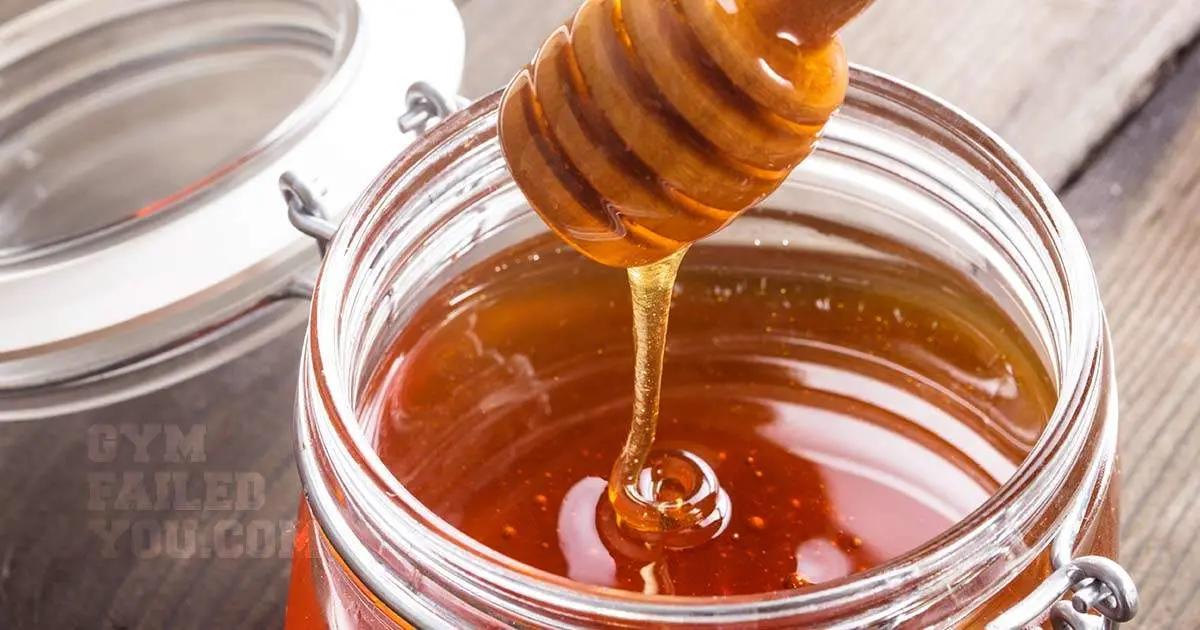What’s all the hoopla about honey anyway? I was talking to a client recently and he mentioned a question his girlfriend asked him about honey. She wanted to know if honey had any benefits in terms of its effects on her blood sugar.
A great question, indeed, and one that I’ve heard many times! Of course, I went off into my usual tangent about how sugar is absorbed and why it does what it does until my client had to throw a dumbbell at me to shut me up! That happens on occasion… a hazard of my trade!
In all seriousness, let’s discuss how honey impacts your blood sugar as well as some other popular benefits.
Glynn’s Guide
Takeaways That Won’t Fail You
- Bottom line, replacing table sugar with honey is a good decision.
- Honey has a lower glycemic index than table sugar.
- There’s not a lot of research to back up the claims of wild vs processed honey.
- If the rest of your carbohydrates are really low, then a teaspoon of honey in your coffee/tea or in a keto-friendly recipe is safe.
- Use caution with honey if you have either form of diabetes and know how it affects your blood sugar. I could not find and peer-reviewed research that concluded without a reason of doubt that honey helps with diabetes.
Table of Contents
Click to Jump to a Section
The Nutrition of Honey
What type of sugar is honey?
How is honey digested?
Is Honey A Healthier Choice than Table Sugar?
Is Raw Honey Healthier than Processed Honey?
What’s the Glycemic Index of Honey?
Can you have honey on a ketogenic diet?
Can Honey Help with Diabetes?
Is Honey Dangerous if you have Diabetes?
Will Eating Honey Help with Diabetes?
Are there Any Other Health Benefits to Honey?
Conclusion
FAQs
Research & References
The Nutrition of Honey
When you eat a tablespoon of raw honey in your food or coffee or tea, it nets you:
- 64 calories
- 22 amino acids
- 27 minerals (including copper and magnesium)
- 17 grams of sugar
- 0 grams of fat
- a tiny bit of protein
What type of sugar is honey?
Honey always contains a mixture of fructose, glucose, and sucrose. What’s the difference?
- Fructose is the sweetest type of sugar. It’s a monosaccharide made up of 6 carbon, 12 hydrogen, and 6 oxygen atoms.
- Glucose is “the king of sugars.” It too is a monosaccharide made up of 6 carbon, 12 hydrogen, and 6 oxygen atoms. The arrangement is just a little different than fructose. It’s part of every disaccharidea disaccharide is a pair of monosaccharides linked together and the one component in most polysaccharides. One of the most common polysaccharides is starch. You can think of starch as foods such as potato, rice, wheat, etc.
- Sucrose is a disaccharide made up of glucose and fructose. You know sucrose as table sugar.
You can learn more about the difference between monosaccharides and disaccharides in my article Why Sugar is So Bad For You. It’s worth a read to understand the difference between sugar types and how they affect us.
How is honey digested?
The first thing to know is that the predominant sugar in honey is unbound fructose. Fructose is treated a little differently by our digestive system compared to plain table sugar. Sugar is absorbed directly into the bloodstream. However, fructose is absorbed into the hepatic portal system and almost entirely cleared by the liver.
The hepatic portal system is a vascular system that collects certain nutrients from the gastrointestinal tract and takes them straight to the liver. In that way, fructose doesn’t have an opportunity to raise your insulin levels. The liver converts it into stored glycogen for use as it is needed. This is a great health benefit when you’re trying to keep your insulin levels at a fairly stable level.
But recall that honey also contains glucose and sucrose, so there is still a rise in blood sugar. Just not as significant.
Is Honey A Healthier Choice than Table Sugar?
Yes, honey is a healthier choice than table sugar (sucrose). It has a lower glycemic index (due to its fructose content). And it also includes healthful nutrients than table sugar lacks.
Is Raw Honey Healthier than Processed Honey?
I’m an advocate of minimally processing any food and prefer the flavor of wild honey. But does processing honey change any of the following characteristics (the most popular characteristics)?
Keep in mind that the heating of honey after collection is to help eliminate the potential for fermentation during shipping. So, if your honey is not local, chances are it’s been heated.
- Antioxidant: Polyphenols and water-soluble vitamins are responsible for the antioxidant properties of honey. I could not find any research showing a significant difference between raw and processed honey on antioxidant activity.
- Antibacterial: I could not find any research supporting a change in honey’s antibacterial properties.
- Allergies: I found some research mentioning the use of local wild honey and desensitizing one to local pollen. I have tried this with no change in my allergies.
TL;DR Wild vs Processed Honey
Allow your palate and budget to dictate what you buy since more research is needed to clarify the health benefits of wild vs processed honey. If you have access to local wild honey, it typically tastes better and may assist with minimizing allergies. But it costs more.
What’s the Glycemic Index of Honey?
If you’re consuming honey by itself, the glycemic index of pure honey is around 58. Yes, that number can differ slightly due to the different types of honey. And if you combine honey with other foods, that changes everything.
What is the glycemic index? Okay, a quick recap.
The glycemic index is a way to measure a specific food’s effect on our blood sugar. A high number indicates rapid absorption and a spike in blood sugar. A low number indicates slow absorption without a spike in blood sugar.
Honey’s glycemic index rides right in the middle of the road.
But the glycemic index of honey is only relevant if you’re consuming honey by itself.
Can you have honey on a ketogenic diet?
This is a question I’ve heard on numerous occasions. Technically, it depends on the other carbohydrates in your diet. In my article, How to Get into Ketosis Fast and Staying There [Safely], I discuss keeping your carbohydrates under 30 grams a day. This is not easy.
Keep in mind that honey has approximately 17 grams of carbohydrates per Tbsp (16 are sugars). Yes, it’s lower glycemic, but be careful with honey. It’s easy to overindulge.
Now, if there’s a small amount of honey in a keto-friendly recipe, it should be fine.
Also, if you want to use a teaspoon of honey in your coffee or tea, that will be fine. Again, I caution about overconsumption.
TL;DR Honey and a Ketogenic Meal Plan
If the rest of your carbohydrates are really low, then a teaspoon of honey in your coffee/tea or in a keto-friendly recipe is safe.
Can Honey Help with Diabetes?
Upon my review of the peer-reviewed literature, I could not find any studies that concluded without a reason of doubt that honey helps with diabetes. In other words, more research is needed.
So, turning to honey as an alternative sweetener based on its lower glycemic index might have merit. But read on to learn more.
Is Honey Dangerous if you have Diabetes?
Some research suggests using honey as a replacement for table sugar in diabetics. But I caution you against this. Other studies contradict using honey with type I diabetes.
And Zamanian’s meta-analysisA meta-analysis an assessment of prior research to define a conclusion published in 2020 found “Blood glucose or HbA1c was significantly reduced after consumption of honey in seven studies. However, blood glucose or HbA1C did not differ significantly in two studies, and significantly increased in two other studies following ingestion of honey.”
In other words, use caution with honey if you have either form of diabetes. Self-checking blood sugar after consumption is the best way to see how you respond. You know, like every other food you eat.
Will Eating Honey Help with Diabetes?
Again, in my review of the peer-reviewed literature, I could not find any studies that concluded without a reason of doubt that honey helps with diabetes. In other words, more research is needed.
So, turning to honey as an alternative sweetener based on its lower glycemic index might have merit, but be careful. If you’re a diabetic, you already know how to check yourself after each type of food. The same applies to honey.
TL;DR On Honey and Diabetes
Use caution with honey if you have either form of diabetes and know how it affects your blood sugar. I could not find any peer-reviewed research that concluded without a reason of doubt that honey helps with diabetes.
Are There Any Other Health Benefits to Honey?
A few claims that are not mentioned elsewhere in this article are:
- Wound healing: I believe the direct application is beneficial due to the antimicrobial properties of honey.
- Allergies such as hay fever: I believe this due to conditioning individuals to small doses of different pollens do slowly desensitize the reaction to pollen.
Conclusion on the Benefits of Honey
Honey does have some medicinal properties and is a superior choice to table sugar. So if you’re able to utilize honey sparingly, it’s okay as a sweetener. This is due to its lower glycemic index, additional nutrients, and how it is absorbed. But it’s easy to overindulge, so be careful.
There will always be embellished healthful claims about any natural food and honey is no exemption. So always take these claims about honey with a grain of salt. There is some validity, but not soundproof.
That said, honey is delicious, so the bottom line, replacing table sugar with honey is a good decision.
FAQs
Why honey is better than sugar?
Referring to honey vs table sugar, honey is lower glycemic (absorbed more slowly). And it also contains beneficial nutrients whereas table sugar does not.
What honey should I buy?
If you have access to local wild honey, it typically tastes better and may assist with minimizing allergies. Allow your palate and budget to dictate what you buy since more research is needed to clarify the health benefits of wild vs processed honey.
Will honey make you fat?
Any food in excess will make you store fat. Although honey will contribute less to fat storage than table sugar.
Can honey expire?
Yes. Pasteurized honey lasts longer than wild honey due to the elimination of eventual fermentation.
Research & References
Abdulrhman, M., El-Hefnawy, M., Hussein, R. et al. The glycemic and peak incremental indices of honey, sucrose, and glucose in patients with type 1 diabetes mellitus: effects on C-peptide level—a pilot study. Acta Diabetol 48, 89–94 (2011).
M. Alvarez-Suarez, Jose; Giampieri, Francesca; Battino, Maurizio, Honey as a Source of Dietary Antioxidants: Structures, Bioavailability and Evidence of Protective Effects Against Human Chronic Diseases, Current Medicinal Chemistry, Volume 20, Number 5, 2013, pp. 621-638(18).
Mohsen Bahrami, Asal Ataie-Jafari, Saeed Hosseini, Mohammad Hasan Foruzanfar, Mazaher Rahmani & Mohammad Pajouhi (2009) Effects of natural honey consumption in diabetic patients: an 8-week randomized clinical trial, International Journal of Food Sciences and Nutrition, 60:7, 618-626.
Cianciosi, D.; Forbes-Hernández, T.Y.; Afrin, S.; Gasparrini, M.; Reboredo-Rodriguez, P.; Manna, P.P.; Zhang, J.; Bravo Lamas, L.; Martínez Flórez, S.; Agudo Toyos, P.; Quiles, J.L.; Giampieri, F.; Battino, M. Phenolic Compounds in Honey and Their Associated Health Benefits: A Review. Molecules 2018, 23, 2322.
Groff, JL et al. Advanced Nutrition and Human Metabolism, St. Paul, MN: West Publishing Company, 1995.
D. P. Mohapatra, V. Thakur, and S. K. Brar, Antibacterial Efficacy of Raw and Processed Honey, Biotechnology Research International, 2011, Volume 2011
Scepankova H., Saraiva J.A., Estevinho L.M. (2017) Honey Health Benefits and Uses in Medicine. In: Alvarez-Suarez J. (eds) Bee Products – Chemical and Biological Properties. Springer, Cham
Shambaugh P, Worthington V, Herbert JH. Differential effects of honey, sucrose, and fructose on blood sugar levels. Journal of Manipulative and Physiological Therapeutics. 1990 Jul-Aug;13(6):322-325.
R. Subramanian, H. Umesh Hebbar & N.K. Rastogi (2007) Processing of Honey: A Review, International Journal of Food Properties, 10:1, 127-143.
Wang, X.H., Gheldof, N., and Engeseth, N.J. (2004), Effect of Processing and Storage on Antioxidant Capacity of Honey. Journal of Food Science, 69.
Maryam Zamaniana, Fatemeh Azizi-Soleimanb, Honey and glycemic control: A systematic review, PharmaNutrition, Volume 11, March 2020, 100180.




